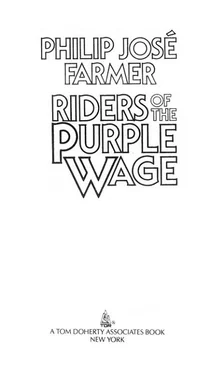Farmer Philip - Riders of the Purple Wage
Здесь есть возможность читать онлайн «Farmer Philip - Riders of the Purple Wage» весь текст электронной книги совершенно бесплатно (целиком полную версию без сокращений). В некоторых случаях можно слушать аудио, скачать через торрент в формате fb2 и присутствует краткое содержание. Год выпуска: 2014, Жанр: Социально-психологическая фантастика, на английском языке. Описание произведения, (предисловие) а так же отзывы посетителей доступны на портале библиотеки ЛибКат.
- Название:Riders of the Purple Wage
- Автор:
- Жанр:
- Год:2014
- ISBN:нет данных
- Рейтинг книги:5 / 5. Голосов: 1
-
Избранное:Добавить в избранное
- Отзывы:
-
Ваша оценка:
- 100
- 1
- 2
- 3
- 4
- 5
Riders of the Purple Wage: краткое содержание, описание и аннотация
Предлагаем к чтению аннотацию, описание, краткое содержание или предисловие (зависит от того, что написал сам автор книги «Riders of the Purple Wage»). Если вы не нашли необходимую информацию о книге — напишите в комментариях, мы постараемся отыскать её.
Gnatcatcher did not explain. He roared. “Get me the White House! And get another court order! We’re invading the house!”
“The White House, sir?” Smith said faintly.
“No, you imbecile! The house of Agrafan and Netter! Have our men armed, ready to shoot the first sign of resistance! Can you get hold of bazookas?”
Riders of the Purple Wage — читать онлайн бесплатно полную книгу (весь текст) целиком
Ниже представлен текст книги, разбитый по страницам. Система сохранения места последней прочитанной страницы, позволяет с удобством читать онлайн бесплатно книгу «Riders of the Purple Wage», без необходимости каждый раз заново искать на чём Вы остановились. Поставьте закладку, и сможете в любой момент перейти на страницу, на которой закончили чтение.
Интервал:
Закладка:
The house had been built in A.D. 1900 in a suburb of Detroit. Operating from within it, making contact with their servants by telephone and with their business managers by phone and messengers, the two had worked hard for twenty-nine years. It was they who purposely brought about the stock market crash of 1929 and the Great Depression. Unfortunately, the Uranian science-art of calculating trillions of physical factors and trillions of mental vectors had not been as well developed then as it was in the early part of the twenty-first century. The effect of the depression had not been quite what they had calculated. The depression had brought about World War II and, thus, a great step forward in the development and use of rockets. This, in turn, had accelerated and intensified the drive of Earth people to conquer space. Agrafan and Netter would have done better if they had kept Earth’s economy prosperous.
Since World War II, the two agents, collaborating with their Uranian colleagues via atomic-impingement waves, had brought event influencing and calculating to a higher level. Or so they hoped. This time, they would certainly set back space exploration for a long time and, hence, destruction of Uranian higher life-forms.
World War II had also caused the invention of the atom bomb much sooner than anticipated. Agrafan and Netter could have started nuclear warfare any time in the last fifty years. They had twelve different ways to bring this about. The danger to Uranus would have been removed forever. That it would also have caused their deaths did not bother Agrafan and Netter. They were willing to sacrifice themselves.
But, though so unhuman-looking and lacking much of the physical and emotional warmth of humans, the Uranians were moral. It was not right to destroy the entire life of Earth just to keep themselves from a possible extermination. All things connected, impinged, and transmitted. The ethical mathematics of the universe made such a deed not only a cardinal sin but an ordinal one.
No. The extinction of Earth people was not the way out. The Uranians must just delay the space projects for a long, long time. Above all, they must halt the exploration around Uranus. And this must be done soon. Calculations of all verifiable data showed that the optimum time to complete this phase of their operation was three weeks from now. That delay might mean, probably would, the deaths of the strong-looking but fragile babies orbiting Uranus in the epsilon ring. The estimate was a loss of four hundred—if the Herschel crew continued pulling in the babies. They probably would. And they would know enough now to trickle-dìscharge the field on the babies before collecting them. Even so, four hundred babies would die, but that loss would not mean a serious break in the chain of Uranian reproduction and growth.
However, the crew might notice, probably would, the occasional ascent of fiery-tailed egg clusters from the green clouds into space and toward the epsilon ring. The Herschel might locate and take some of these into the bay. If they did, their examination of the eggs, which looked like small, rough rocks, might—probably would—reveal the embryonic life-forms within them.
Then there would be no stopping the scientists. They would probe the atmosphere of the planet with radar and laser, and the two forms of the adult Uranian, the flying colonies, would be known. What then?
The Uranians’ observation at long distance of Earth and the reports of their two agents on Earth had convinced them that war was a deeply established terrestrial cultural trait. It would be a long, long time before the Earth people shucked that trait. The Uranians were willing to wait for that, but until then they wanted to keep Earth people far, far away from them.
Hence, the Uranian Field Operation.
Just now, Agrafan and Netter went watching a TV screen which displayed in infrared. This was connected to a conventional set in another part of the house, the warm part inhabited by the staff of servants and the butler, Goll. Agrafan’s remark about Walt Whitman had been evoked by the name of a character, Lance Whitman, in the soap opera Dinah Stye. All things connect, impinge, and transmit. One thing leads to another, and then the whole universe is moving.
Another show, The Signs of the Times , had followed the soap opera. Rod de Massas, the host, was saying: “The wave of Aquarius started in 1998. Aquarius, as we know, is the sign of dreams and aspirations of betterment and ideals. So far, there seems to have been little of this because of the worldwide wars, revolutions, and violent agitation for social, political, and economic reform. These, however, have been motivated by idealism, the fierce desire to make changes for the better.
“Also, as I predicted in 1998—the stars never lie—the first fourteen years of Aquarius were still influenced by Capricorn. But that pernicious influence is a dying wave. The age of Aquarius is beginning to bloom. It will flourish as it never has before, will be far stronger now than at any time in the past. The world will begin its march toward Utopia. The Neptune factor will have ebbed to silence, and the times will be controlled by the ruler of Aquarius, the planet Uranus.”
“Half-right, half-wrong,” Netter said.
“Mostly wrong, but he should be honored for the tiny fraction of right,” Agrafan said.
Even in “empty” space, particles and radiation impinged on each other, resonated, bumped, and penetrated. The universe was crammed with shocks, small and big; everything affected everything else. Some things were, from the sentient viewpoint, more influential than others. Size, location, distance, and velocity of inanimate things and animate beings determined what was most influential. There were also the factors of weak and strong linkage and of intent.
Intent, of course, was possible only for animate beings, except the star Sirius and a rather far-off galaxy.
The Uranians knew that the total interconnectedness of all matter was a fact. But it was and probably always would be impossible to know the size, location, and velocity of every bit of matter in the universe. The data they could get about the solar system was a mere microfraction of what was needed for even gross influencing. Nevertheless, on Earth, the two agents had had considerable success in predicting and influencing on a rather gross level. It was, however, their ignorance on a fine-grain level that now threatened their plans. They did not know that Gnatcatcher had been suffering for a long time from a duodenal ulcer.
They could not be blamed for this. Gnatcatcher had not told anybody about it because he was obsessed with his power as district IRS director. If he went to the hospital for tests and probably, for surgery, his assistant would take over his directorship. Gnatcatcher would be powerless for a long time. And who knew what machinations his assistant might resort to in order to oust his boss?
The increasing pain from the ulcer was, however, making him behave less cautiously than he should, not to mention less legally. The news about the secret global business empire of Agrafan and Netter and the suspicion that they might be—must be—cheating the IRS made his ulcer flare up like a sunspot and his anger explode like a nova.
“Get everybody and every machine on this! Drop everything else! Twelve-hour shifts! We won’t stop until we’ve accounted for every penny they owe us!”
Agent Brown was tactful enough not to point out that there was no evidence whatsoever at this time that Agrafan and Netter had cheated Uncle Sam. Agent Smith also said nothing to his boss, but, an hour later, he phoned Goll, the butler. Smith told Goll all that had happened and was likely to happen. Gull thanked him and said that $200,000 in cash would arrive at Smith’s mailbox tomorrow. Goll then phoned his employers.
Читать дальшеИнтервал:
Закладка:
Похожие книги на «Riders of the Purple Wage»
Представляем Вашему вниманию похожие книги на «Riders of the Purple Wage» списком для выбора. Мы отобрали схожую по названию и смыслу литературу в надежде предоставить читателям больше вариантов отыскать новые, интересные, ещё непрочитанные произведения.
Обсуждение, отзывы о книге «Riders of the Purple Wage» и просто собственные мнения читателей. Оставьте ваши комментарии, напишите, что Вы думаете о произведении, его смысле или главных героях. Укажите что конкретно понравилось, а что нет, и почему Вы так считаете.









![О Генри - Пурпурное платье [The Purple Dress]](/books/405339/o-genri-purpurnoe-plate-the-purple-dress-thumb.webp)

